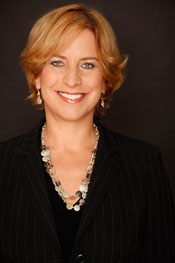
Vivian Schiller has a warning to her former colleagues at NPR: “Your continued existence is not guaranteed.”
But that warning — delivered yesterday in a talk at Harvard’s Shorenstein Center — wasn’t just about the congressional fight over public funding. It was about what she sees as the imminent threat of Internet radio in cars. “The monopoly advantage of the radio tower will begin to fade,” she said, delivering her remarks in the form of an open letter to public broadcasters.
“New digital-only startups will enter the marketplace in audio, and you will find yourselves longing for the days when the competition was that public radio station that overlapped with your broadcast signal,” she said.
The Shorenstein Center has posted audio of Schiller’s hour-long talk and Q&A; you can download the MP3 or listen to it below:
[audio:http://www.niemanlab.org/audio/schiller-shorenstein.mp3]
Schiller suggested member stations adjust to the threat by starting to offer additional, online-only streams. If the local NPR station is serving news when a listener wants music, Pandora is just a click away. And, as Schiller warned in our predictions-for-2011 package in December, that kind of audio flexibility is coming to cars, terrestrial radio’s strongest bastion.
She said public radio could learn a few things about competition and innovation from its commercial counterparts, having worked in for-profit media herself (CNN, Discovery, The New York Times). She urged public radio to take more risks.
“You are now competing in the big leagues and are no longer the scrappy underdog,” she said. “You must become your own disruptors. If you don’t aggressively reach out to new audiences on new platforms, someone else will. There is no such thing as lasting media loyalty, especially in this age of media promiscuity.” She said public radio needs to “let go of the nostalgia” of the craft.
In questions afterward, Schiller said little about what’s next for her post-NPR (other than “a week on the beach”) and had little to add about the controversies that led to her departure. Schiller brushed off suggestions that NPR cut ties to member stations, which receive a vast majority of the famously fraught federal funding, saying the national-local partnership model is the network’s “special sauce.” She said the surest way for stations to survive is to deliver locally focused content, alongside NPR’s national and international reporting, on every platform possible.